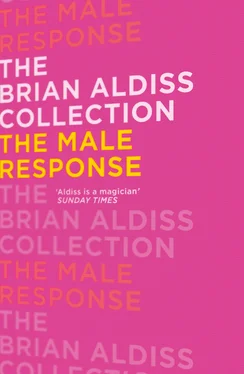‘With patient look, thou watchest …’
All men think alike; no two act alike.
In Umbalathorp there were, quite unknown to Soames, several people who considered themselves interested parties where he was concerned and who, from the moment of his arrival, vibrated with a passion of curiosity about him. In the thoughts of each, he appeared as a pawn merely, an object they could profitably, for one reason or another, incorporate into their own designs. But the ways in which they set about arranging a meeting with him were diverse; the meeting became, to one, an ambush, to another an attack, to another a lure, to another only a wary circling.
Timpleton also was under surveillance, but to a lesser degree. It was recognised from the start, in the uncanny fashion one does recognise such things, that Soames, of the two, was – in the expressive American phrase – loaded. Soames, though he would have shrunk from the idea, conformed to the slightly dated and therefore doubly appealing world-image of The Englishman Abroad to a remarkable degree. His indecisiveness, by which an inward panic frustrated all outward action, chimed curiously in all its external aspects with the British tradition for keeping one’s head while all around are losing theirs; and the delicacy with which, on first riding through Umbalathorp, he had averted his eyes from its grosser squalors had easily been misinterpreted as the chill aloofness of a white barra sahib.
Eyes, hostile, friendly and calculatingly neutral, had read these marks upon Soames on his arrival and during his ride through the market, and had laid their plans accordingly. The first of these plans to develop from the theoretical to the practical phase was that of Queen Louise.
The Queen descended upon him while he was still surveying his room. Timpleton had been shown by a servant to another, similar room down the corridor. Apart from the tropical generosity of window space, this might have been the cell of a top-brass priest on Mount Athos; it was of whitewashed stone, furnished only with bed, chair and chest of drawers. The bed was covered with a bright rug. The big brass bowl on top of the chest contained a handful of dead leaves.
The Queen knocked and swept into Soames’ room, accompanied by a small, tittering maid, almost before he had time to cry ‘Come in’. She was a large, ugly woman, with nostrils as mobile as gills and skin the colour of strong tea; when she announced herself, one heard the loud but inaudible fanfare of trumpets.
‘You may kiss my hand, Mr Soames,’ she said, in clear English, ‘but otherwise no formalities. Kindly address me as “Queen Louise”, as do my other subjects. Come, I shall be good enough to show you round the palace.’
Soames protested that his clothes looked too disreputable, that when the expedition to the plane returned he could make himself more presentable for such an honour.
‘If I show you round as you are, that only makes the honour more great,’ Queen Louise said. ‘Please step along – I am, alas, not with much patience.’
It was difficult to decide what to say to this lady, Soames thought, as he followed into the corridor, jostling to get past the little maid to the Queen’s side, for her manner was impersonal enough to make one wonder if she was being formal or friendly. In the end, he tried for common ground by saying, ‘It is a pleasure to meet the mother of Deal Jimpo, whom I have grown to like very much.’
‘Of course,’ the Queen said. ‘I shall not deny you any pleasure you ask. You shall see her copiously soon.’
This plunged Soames into eddies of confusion. He felt like a male Alice walking beside a composite of the Queen of Hearts and Humpty Dumpty. Either Queen Louise was referring to herself in the third person, in the manner of Caesar’s ‘Caesar is turned to hear’, and offering to strip for him, or they had somehow come a cropper over the language barrier.
‘You are Jimpo’s mother?’ he enquired hesitantly.
‘Not I,’ said the Queen. ‘I am the mother of lovely, intellectual Princess Cherry, whom you shall soon meet. Jimpo is the son of the President’s wife.’
‘But you are the President’s wife.’
‘I am the King’s wife.’
‘But President and King are one!’
‘They are held by one person, but they are two separate offices, each of which is entitled to one wife.’
‘Oh.’
‘I make bed with the King; that is fealty. I must not make bed with President; that would be adultery.’
‘You must find these rather fine distinctions difficult to draw at times,’ Soames murmured.
‘It needs mighty discipline,’ said the Queen with relish.
She swept him into an empty banqueting hall, clapped her hands and ordered him to sit down on a couch. She deposited herself beside him. When the gamelan-like harmonies of the springs had died, she began to interrogate him, first about England, then about himself. To excuse this interest, she claimed she had British blood in her veins, but did not amplify the point.
‘The climate of Umbalathorp is good,’ she said, changing the subject abruptly. ‘You find it so?’
‘I have no complaints so far,’ Soames said, permitting a slight sulkiness to enter his voice.
‘It is good,’ the Queen said. ‘Even the wretched Mr Picket thrives here, although he is an Englishman of another sort. I have read in a Geographical Magazine that the English race comes from the tropics, and Princess Cherry is also very educated, reading great many books. She will make somebody, some privileged personage, a good wife one day. No doubt you are eager to meet her?’
‘Perhaps when my own clothes …’
‘She is engaged with her studies in the library now,’ said the Queen, ‘but it is possible to interrupt. Come, I know you will like her.’
Soames and the little black maid scurried after her, down a dark passage and into a room full of rickety shelves, on some of which reposed books and magazines. On a long cane chair lay Princess Cherry, heiress to her mother’s estate and physiognomy. She wore a heavy, heavily flowered dress; a blue plastic bow slide was clipped into her tight curls. One pair of earrings adhered to her ears, another was clipped to the superb dihedral of her nostril flanges. In her hand, negligently, was a copy of Thomas Mann’s Buddenbrooks ; it was right way up.
‘This is the Englishman, Mr Soames, Princess dear,’ said the Queen. ‘Get up and put your shoes on at once.’
The Princess complied and said, guiltily, ‘How do you do? Possibly you like to sit down in my chair and read something?’
‘Perhaps I might borrow something to have in bed tonight,’ Soames said. A slow flush crept over his face, in case they should think he had been attempting an innuendo, but both faces were – features apart – blank.
‘So you are a literary man?’ enquired Queen Louise, looking at her daughter to prompt her to take over the conversation. ‘The English are a great literary nation as well as conquering parts of Africa.’
‘I read quite a bit,’ Soames agreed.
‘The English are a very great literary nation,’ the Princess admitted uneasily.
‘What do you read – besides Buddenbrooks ?’ Soames enquired. He would have enjoyed the conversation better had the Queen not been drawn up like an RSM behind him; she was breathing deeply, like a man receiving a VC at Buckingham palace.
‘I read Buddenbrooks for a long time,’ said the Princess sadly. ‘The servants forget to bring me tea when I sit here in this room – library. Also I read John Keats’ “Ode to Autumn”, which I like. It is a poem. Have you heard of it?’
‘Oh, yes, of course,’ Soames said. They had swotted up the Ode for School Cert, fifteen years ago. ‘For summer has overfilled their clammy cells.’
Читать дальше












